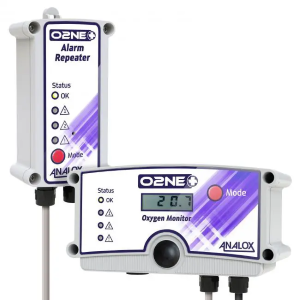
O2NE+
A simple to use and maintain ambient oxygen depletion monitor and sensor, ideal for monitoring oxygen levels where inert gasses such as N2, Ar or He pose a risk of depleting O2 levels in ambient air.
The O2NE+ key features include:
- 1 x main sensor unit and 1 x remote repeater alarm
- Long-life oxygen (O2) sensor
- Oxygen (O2) Range: 0.1 to 25%
- IP65 for central unit and alarm repeater
- User changeable sensor
- Calibration can be completed using ‘pure air’
- Plug-in & Go – installed in minutes
- Not cross-sensitive to He
O2 monitoring with the O2NE+
When an inert gas leaks, it displaces the oxygen (O2) posing a risk to life. Oxygen (O2) should be maintained around normal atmospheric levels, 20.9%. Even a very small reduction in oxygen (O2) can cause effects on the human body such as headaches, confusion and shortness of breath.
Using an oxygen (O2) monitor, like the O2NE+ is the best way to protect people in these potentially hazardous environments. The O2NE+ also ensures adherence to exposure limit legislation such as OSHA and EH40.
Oxygen and Helium
The O2NE+ has two pre-set alarm levels at 19.5% and 18% O2. The oxygen sensor used is not cross sensitive to helium so will measure correctly in the presence of a helium atmosphere. This means that the sensor can be safely used to detect oxygen displacement by helium gas leaks.
O2NE+ Legislation
Standards such as OSHA, EH40 and the Confined Space Act advise on permissible limits for oxygen levels.
Technical Specification
O2NE+
| O2 range | 0.1 to 25% |
| Sensory accuracy | better than ± 0.75% O2 over 5.0 to 25.0% O2 |
| Response time | (T90) <60 seconds |
| Operating temperature | 0 to +40 °C (+32 to +104 °F) |
| Temperature effect | 0.2% of reading/°C or 0.1115% of reading/ °F |
| Atmospheric pressure range | 811 to 1050 mbar absolute |
| Warm up time | 10 seconds to normal operation, prior to calibration allow 2 hours to achieve full accuracy. |
| Dimensions | Central unit = 175 x 105 x 75 mm Alarm repeater = 155 x 72 x 45 mm |
| Weight | Central unit = 600g Alarm repeater = 150g |
| IP rating | IP65 for central unit and alarm repeater, unless the alarm repeater is quick connect then it is IP43. |
| Sensor type | electrochemical cell |
| Sensor life | up to 7 years in air* * 7 year life is based on: 25°C temp 1 atm (atmosphere pressure) Exposure to 20.9 O2 in air Differing environmental factors will alter the potential life span. |
| Display | 4 digit LCD |
| Alarms | 2 x alarm visual indicators, 1 x system fault indicator, 1 x status indicator, common audible alarm. |
| Alarm sounder | min 75dBA |
| Relays | one or two optional alarm relays with changeover contacts assigned to alarm 1, alarm 2 or system fault. |
| Contact rating | 240 V AC or 30 V DC at up to 2 A, contacts are non-latching fail-safe. |
| Output | 2 wire, 4 to 20 mA (max load 150 Ω) |
| Power supply options | 210 to 250 V AC supply, 110 to 120 V AC supply, 9-24 V DC supply. |
Quick to install
The O2NE+ is a wall mounted oxygen depletion monitor, perfect to protect those in areas where an inert gas is piped, stored or used.
The system is quick to install and consists of a main sensor unit with digital display and a remote alarm repeater which is placed by the entrance to the room so you know if it is safe to enter or not.
Both parts of the system offer audible and visual alarms and the main unit continuously displays the ambient (O2) levels for the area.
The award-winning O2NE+ boasts a very long-life sensor and requires very little servicing and maintenance.
Built with the user in mind
The O2NE+ comprises of a wall-mounted main sensor unit and a repeater. It is ranged from 0 to 25% O2 and has 2 audio/visual alarms. The sensor is long life and calibration adjustment is only required once the unit is initially installed and following a cell replacement and can be achieved using certified air (unless your local legislation/regulations state otherwise).
We recommend a proof test is carried out every 12 months. The instrument uses an electrochemical cell together with state-of-the-art technology, built in an IP65 splash-proof housing and is designed to provide long, trouble-free service, with minimum maintenance.
Inert gas
The O2NE+ is installed in areas where an inert gas is being used or stored to provide a warning should the oxygen levels deteriorate to an unsafe level. The repeater is located at the entrance to the room, highlighting the danger to personnel before they enter.